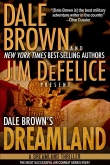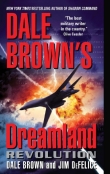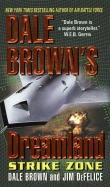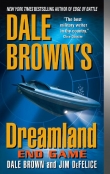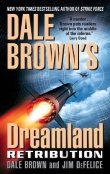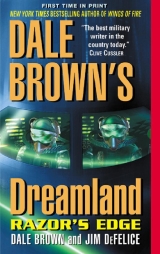
Текст книги "Razor's Edge"
Автор книги: Dale Brown
Жанр:
Боевики
сообщить о нарушении
Текущая страница: 6 (всего у книги 22 страниц)
That’s what it is, and it’s the middle of the day. And I mean, he’s right here, I could have flown right into him.
Popped the canopy and shook hands. But I didn’t use the gun. It happened so fast, I couldn’t.”
Even if his weapon were charged and he was ready to fire, the likelihood of scoring a heads-on shot under the circumstances Hammer described were slim. But he sus-pended his story, blowing a deep puff of smoke into the air from his cigarette to underline his failure.
“So, I turn,” he continued finally. He turned his head to the left, as if watching the MiG pass. “He goes that way.
I’m—slats, flaps, I would have thrown out an anchor, if I could have, to turn and get on his tail. I would have put the engines into reverse. Rewind.”
A long pull on the cigarette took it down to the filter.
Hammer put it in the ashtray thoughtfully and picked up the pack for another.
“So I come out of the turn and the first MiG is right there, three-quarters of a mile. Sidewinder growls again.
Bing. Launch. And just about then the second MiG
splashed my flight leader.”
That was the end of the story, and though Dog waited RAZOR’S EDGE
101
for details—such as what happened to the two men in the Phantom that went down—Hammer didn’t offer them.
After a few minutes of silence, he added a postscript:
“Never underestimate the importance of luck.” Then he left the bar, without lighting the second cigarette.
Hammer’s criticism didn’t seem quite so harsh after that. In spite of it, Dog and he became reasonably decent friends. Dog was in his wedding party and had been invited to Hammer’s son’s christening, though he was in Germany at the time and couldn’t attend. The boy, whom he’d met several times, would be four or five now.
Hammer and his wife had waited to have kids, largely because he thought what he did for a living carried a hefty risk for a young family. He’d wanted to wait until he was close to retiring. Then he’d enjoy the kid and be safe—safe for him and the wife.
“Penny for your thoughts,” said Ax, materializing in front of his desk. “I knocked, Colonel—sorry.”
“It’s okay, Chief.”
“Secure line for you. It’s back channel.” Ax pointed to the phone.
Dog hesitated, suspecting the call was from someone in the Pentagon looking for inside information he didn’t have.
“You’re going to want to take it, Colonel,” said Ax, who’d retreated to the doorway. “It’s Brad Elliott. He’s in Turkey.”
Dog nodded, then reached for the phone as deliberately as Hammer had sipped his soda that night.
“Hello, General,” said Dog.
“Colonel, I have some information I’d like to give you, so that you have a full understanding of the situation over here,” said Elliott.
Dog had only spoken to him once or twice; never had 102
DALE BROWN’S DREAMLAND
Elliott introduced small talk into the conversation. Which was just fine with him.
“It’s unofficial, of course,” added Elliott.
“Yes, sir, General.”
“I’m not in the Air Force and I’m not your superior,”
said Elliott. “I don’t believe the planes that went down were hit by missiles, contrary to what the analysts are saying.”
“I’m not sure I follow,” said Dog.
“Tecumseh, how much do you know about Razor?”
In any given week, ten or twelve of the pieces of paper that came across his desk dealt with Razor, the favored nickname for the S-500 mobile deuterium chemical laser system. Ground-based, it was being developed as an antiaircraft weapon and had an accurate range of roughly three hundred miles. Aside from some niggling problems in the cooling system and some glitches in the targeting computer and radar, the system was ready for production. Indeed, Dreamland was slated to receive some of the first production units for its own air defense system any day now.
“I know a little about it,” said Dog.
“My suspicion is that the planes were taken out by a clone. It would account for the fact that the radars weren’t on long enough for a missile to acquire the target. The damage is consistent with a Razorlike weapon.”
“Everything I’ve heard points to missiles.”
“Everything you’ve heard is driven by CIA estimates and conventional thinking,” said Elliott. “The problem is, no one believes Saddam has a laser, so naturally they’re looking for something else.”
Deuterium lasers were cutting-edge weapons, and it was difficult to believe a third world country like Iraq could develop them or even support them. Then again, few people had believed Iraq had a nuclear weapons pro-
RAZOR’S EDGE
103
gram until the Gulf War and subsequent inspections.
“If this were the Iranians or the Chinese,” continued Elliott, “everyone would connect the dots. Let me let you talk to someone who was there.”
Before Dog could say anything, Mack Smith came on the line.
“Hey, Colonel, how’s the weather back there?”
“Mack?”
“Hi, Colonel. I bet you’re wondering why I’m not in Brussels. General Elliott borrowed me. He’s on some sort of task force thing, investigating a shoot-down, and since that’s my area of expertise, I hopped right to it.”
Dog rolled his eyes. Elliott obviously said something to Mack, and Mack’s voice became somewhat more businesslike.
“So what do you want to know, sir?” asked Mack. “I’ll give you the whole layout. I saw it. Wing came off clean.
Has to be a laser. Iraqis must have stolen it.”
“Did you take pictures, Mack?”
“Yes, sir. Being processed now. CIA has its head up its ass, but what else is new, right?”
Elliott took back the phone. “You know Major Smith,”
he said, in a tone one might use when referring to a way-ward child.
“Yes,” said Dog. “I’d like to get some of my people on this.”
“I agree,” said Elliott. “Dr. Jansen—”
“Jansen’s no longer here, I’m afraid,” said Dog. Jansen had headed the Razor development team at Dreamland.
“I’ll have to check with Dr. Rubeo to get the people together. If we could look at the damage ourselves—”
“Wreckage was blown up in the tangle Mack got involved in,” said Elliott. “Some of the people from Liver-more who worked on high-energy weapons have been analyzing it for the CIA.”
104
DALE BROWN’S DREAMLAND
“And they don’t think it was a laser?”
“They hem and they haw. The NSA has been picking up information about new radars, and the Iraqis have been working on adapting the SA-2,” added Elliott.
“What’s CentCom’s opinion?”
“Their intelligence people are split. There were a lot of missiles in the air, and at one point the AWACS does seem to pick up a contact near the F-16. On this other shootdown, the AWACS had moved off station and the F-15s were temporarily out of range. Heads are rolling on that.” Elliott’s voice had a certain snap to it, the quick un-derstatement a commander used to indicate someone down the line had screwed up royally. “Their view is that it’s irrelevant to their planning—they have to proceed no matter what the threat. Saddam can’t get away with this.”
Dog agreed that CentCom had to press its attacks, but a weapon like Razor changed the tactical situation a great deal. Razor had considerably more range and accuracy than conventional antiaircraft weapons, and defeating it was much more difficult. Most SAMs would be neutralized by jamming their radar. In Razor’s case, however, that was problematic. The jammer itself was essentially a target beacon, alerting a sophisticated detection system to the plane’s location, giving it all the coordinates needed to fire; once the weapon was fired the electronic countermeasures were beside the point—the ray worked essentially instantaneously. On the other hand, waiting to turn the ECMs on until the laser’s targeting radar became active was nearly as dangerous. In theory, though not yet in practice, Razor could work on a single return—by the time the radar was detected, it had fired. Other detection systems, including infrared and microwave located far from the laser itself, could also be used to give the weapon targeting data, making it even more difficult to defeat.
RAZOR’S EDGE
105
But he knew there was no way Saddam could manage the sophistication needed to develop such a complicated weapon, let alone field it. He couldn’t even build a secure phone system.
“Is ISA involved?” asked Dog.
“No. We’re up to our ears with China and the rest of the Middle East right now. This is CentCom’s show. Things are ramping up quickly here, Colonel,” said Elliott. “I wanted you to know what you might be up against. The Megafortresses would be prime targets.”
Dog leaned back in the chair. The seat, the desk, everything in the office had once belonged to Brad Elliott. He’d built this place, fashioned it into a high-tech center comparable to the fabled Lockheed Skunk Works, maybe even Los Alamos, if you adjusted for the difference in budgets and the times.
Then he’d been kicked out, sacrificed because of politics. No, not entirely, Dog amended. Elliott did bear some responsibility for the so-called Day of the Cheetah spy scandal, if only because he was sitting at this desk when it happened.
He’d landed on his feet with ISA, and yet …
“I appreciate the information, General,” Dog told him.
“I’m going to take it under advisement.”
“I don’t want our people, your people, getting surprised,” said Elliott.
“That’s not going to happen,” said Dog, sharper than he intended.
Elliott said nothing. It occurred to Dog that the retired general had probably had a hand in getting the Whiplash order issued—in fact, it may have been the reason he’d been sent to investigate in the first place.
“Thank you, General,” Dog told him. “I appreciate the heads-up.”
“You’re welcome.”
106
DALE BROWN’S DREAMLAND
The line went dead. Dog keyed his phone. “Ax, get Rubeo over here. I need to talk to him.”
“Dr. Ray is on his way,” said Ax. “How ’bout lunch?”
“How’d you know I wanted to talk to him?”
“Musta been a coincidence,” said the chief master sergeant. “Ham or roast beef?”
“Neither,” said Dog.
“Yeah, I know you want a BLT. I was just testing you.”
Dog was tempted to call Ax’s bluff by saying he’d have something completely different, but before he could, there was a knock on the door and an airman entered with a tray.
“Ax,” said Dog, still on the phone, “if—”
“Light on the mayo, easy on the burn,” said the chief, sounding a little like a short-order cook. “Anything else, Colonel?”
Incirlik
28 May 1997
0700
TORBIN DRESSED QUICKLY AND THEN HEADED OVER TO THE
squadron ready room, skipping breakfast. Though he’d managed nearly six hours of sleep, his body felt as if he’d spent the time driving a jackhammer into several yards of reinforced concrete. He walked with his head slightly bent, nodding as others passed without actually looking at them. He’d gotten a few steps into the building when a lieutenant called his name and told him that General Harding wanted to talk to him.
Harding was in charge of the wing Glory B was assigned to. Torbin didn’t know where his office was and had to ask for directions.
RAZOR’S EDGE
107
“General, I’m Captain Dolk,” said Torbin when he finally arrived. He stood in the doorway of the office, one hand on the doorjamb.
“Come in, Captain. Close the door, please.”
The general began talking before Torbin sat. The first few words blurred together—rough out there, all hell breaking loose, a difficult job. “The Phantom is an old airframe,” continued the general. “I used to fly them myself, back in the Stone Age.”
“Yes, sir,” said Torbin.
“Things have changed tremendously. Hell, we’re using AWACS, standoff weapons, GPS—we’re even going to have a pair of Megafortresses helping out. The Wild Weasel mission belongs to an earlier era.”
He thinks I fucked up, Torbin realized.
“These days, we can jam radars with ease. Locate ’em, knock ’em out before they turn on. That’s the way to go.
Much safer than waiting for them to turn on. I have a pair of Spark Varks and a Compass Call en route.”
“General, we can still do the job.”
Harding drew himself up in the chair and held his round face slightly to the side. His cheeks, ruddy to begin with, grew redder. “There’s no mission for you today, son. You’re to stand by until further notice.”
Torbin waited for the general to continue—to ball him out, to say he screwed up, to call him an idiot. But he didn’t.
“I didn’t screw up, sir,” said Torbin finally. “I didn’t.
My pilot didn’t and I didn’t.”
Harding stared at him. He didn’t frown, but he sure didn’t smile. He just stared.
“I’ll do anything I can,” said Torbin finally. “Anything.
The radars that came on, the missiles—they were too late and too far to hit those F-15s.”
“I appreciate your sentiments,” said Harding.
108
DALE BROWN’S DREAMLAND
Torbin felt the urge to smash something, kick the door or punch the wall. He wanted to rage: No way I screwed up! No stinking way!
But he took control of himself, nodded to the general, then walked slowly from the office.
Aboard Quicksilver , over southeastern Turkey 1300
ZEN FELT A SUDDEN SHOCK OF DISPLACEMENT AS THE
Flighthawk slipped away from the Megafortress, launching herself as the mothership rose on the stiff wind’s eddy. No matter how many times he did this, it still took a moment to adjust to the difference between what his body felt and what his eyes and brain told him it should feel.
And then he was in the Flighthawk, seeing and feeling the plane through his control helmet and joystick. He fingered the speed slider and nudged toward the rift in the peaks where the scratch strip sat.
“Systems in the green,” said Fentress, monitoring the flight from his station next to Zen.
“Thanks.” Zen pushed the Flighthawk downward against the violent and shifting winds. A thick layer of clouds sat between the Flighthawk and the airstrip, but the synthesized view in his screen showed every indentation in the rocks and even gave a fairly accurate rendering of the brownish-gray concrete that formed the landing area.
It looked to be in much better shape than they’d expected.
Still, even if Danny’s plan worked, the strip was going to be on the narrow side. Zen slid the Flighthawk into a bank, gliding five thousand feet above the shallow ridge that formed the main obstacle to lengthening the runway.
“I’m going to get under the clouds so we can get the RAZOR’S EDGE
109
precise measurements,” he told Breanna over the interphone.
“Go for it.”
“Looks narrow down there, Bree,” he added.
“Thanks for the vote of confidence.”
Zen slipped under the clouds and manually selected the video feed for his main display. Mountaintops spread out on the horizon, giants sleeping beneath green and brown mottled blankets.
“Bree could slide pickles into an olive jar,” said Chris Ferris, the copilot.
“Watch your language,” joked Breanna.
“I didn’t say you couldn’t handle it,” Zen said. “I said it would be tight.”
“I thought you slept on the way over,” said Breanna.
“I did. Why?”
“You sound a little testy.”
“Airspeed dropping,” said Fentress.
“No shit,” snapped Zen, turning his full attention back to his plane. Indicated airspeed had nudged below 300
knots. He backed his power off even more, letting it slide through 250. The small-winged U/MF became in-creasingly unstable as its speed dropped, but Zen needed the slow speed so they could get a good read on the target area. “Computer, begin dimension survey as programmed.”
“Computer,” acknowledged the Flighthawk’s C3 flight system. “Dimension survey initiated.”
“Captain Fentress, give the feed to the flight deck,”
said Zen.
“Aye aye, sir,” said Fentress, apparently trying to joke—a new development that Zen had to leave unremarked, as the Flighthawk hit a gnarly gust of wind. He ramped up thrust but was nudged off course and had to start the whole run over again.
110
DALE BROWN’S DREAMLAND
“If we had more altitude, I could get a better angle for Captain Freah,” said Fentress, who was giving Freah the feed so he could plot his jump after the missiles did their work. “Save some time.”
“Curly, let me fly my plane, okay? We’ll do it like we rehearsed.”
“Yes, sir,” said Fentress.
They were silent until he reached the end of the runway area and began recovering.
“We’ve got it up here, Jeff,” said Breanna. “Glitch downloading the targeting data to the missiles. Take us a minute.”
“Flighthawk commander acknowledges.”
“Getting awful formal,” said his wife.
“Just doing my job, Quicksilver leader.”
Breanna didn’t answer. Chris Ferris marked the location on the Megafortress’s automated targeting system, then opened the bomb bay doors. The two hand-built missiles whose noses looked like spherical clusters glued together sat on a massive rotating bomb rack in the rear of the plane.
Ferris gave a countdown to launch, handing the process to the computer at five seconds. A sharp metallic trrrrshhhhh sounded over the interphone circuit as the first missile launched; 3.2 seconds later the second tore away.
“Ground wire loose somewhere,” said Louis Garcia, who was sitting in the rear bay. “Going to have to fix that when we get down.”
“Three seconds to target,” said Ferris. “Two, one—”
Over southeastern Turkey
1310
WHEN THE BACK DOOR OF THE MC-17 OPENED, THE TEM-perature inside the hold dropped dramatically. The cold RAZOR’S EDGE
111
bit at Captain Danny Freah’s skin despite the layers of thermals and special drop suit he wore. But at least it meant they’d be getting to work soon—the worst part of any operation was the wait.
Danny moved his hand up to the visor of his combat helmet, clicking the control to increase the resolution on the feed he was receiving from Zen’s U/MF. A fair amount of smoke lingered from the explosion, but the weapons seemed to have done their job perfectly.
“We’re up next,” said the transport pilot. The communications and video were piped in through a hardwire; the MC-17B/W did not yet have an internal wireless connection. “Should be good to go in zero-one minutes.”
“Show’s under way,” Danny told the others in his team.
“Look alive, look alive,” said Hernandez, the team jumpmaster. Though he’d already checked everyone’s equipment twice in the past five minutes, he began one last inspection.
“First pass is for the ’dozers,” Danny said, though the reminder wasn’t necessary.
“Sure I can’t ride one down?” asked Powder.
“Next jump,” said Danny.
“He just wants to make sure he gets his turn driving,”
said Egg Reagan. “Trying to bump me.”
“I ain’t bumpin’ you. It’s Nursey who shouldn’t be at the wheel. You ever ride in a Humvee with him?”
“I’m not the one who lost his license,” answered Nurse.
“Who lost their license?” asked Danny.
“Just a rumor,” said Powder.
“We’re cleared,” said the MC-17B/W pilot. “Dust is settling. Okay, boys, look good.”
One of the loadmasters near the tail ramp waved a fist in the air, then pushed a button on the thick remote control panel in his hand. The bulldozer closest to the doorway jerked forward on its skid; lights flashed above the 112
DALE BROWN’S DREAMLAND
opening. In the meantime, the MC-17 slowed dramatically, its jet engines whining and shuddering. Danny tightened his grip on the rail behind him as the plane turned herself into an elevator, gliding down ten stories in the space of a few half seconds. The two bulldozers lurched forward on their automated launch ramp. They slowed as they cleared the door, seeming to stop in midair before bobbing outward, one after another.
Danny turned his gaze back to the top half of his visor and its feed from the Flighthawk. A lot of dust, nothing else. Then a large black rock furled into view, followed by another. As the U/MF flew past, smoke and dust started to clear and Danny saw the drogue chutes chuttering off to the right, the ’dozers sitting on the ground.
“Fuel’s up,” said the loadmaster. Two more crates made their way toward the door. These were perfectly square. Four barrels of diesel fuel for the ’dozers, along with some hand pumps and additional equipment, were contained inside custom-made cylinders packed into the spidery interior lattice of the special shock-absorbing crates. Following the fuel were two more skids with jackhammers and assorted gear. After they were out, the MC-17 began climbing to give them a little more room for their jump.
“Wind’s a bitch out there, boys,” said Hernandez. “Be sharp.”
“As a pin,” said Powder.
Danny took a breath as the yellow light came on above the door, indicating that they were almost ready. He took his place in the second line, still holding the rail as they waited for Hernandez’s signal. The seven men on the team went out practically together, two teams abreast holding hands.
A “normal” rig for a recreational parachuter always includes a special altimeter device to deploy an emergency RAZOR’S EDGE
113
parachute once the jumper passes a preset altitude in case the main chute fails. A device that worked on essentially the same principles in the Whiplash jumpers’ gear deployed their MC-5 ram-air parachutes based on a prepro-grammed glide course. Sending GPS data as well as altimeter readings to their combat helmets, the “smart rigs” turned the Whiplash team members into miniature airplanes. They steered the boxy, rectangular chutes through the swirling winds, their bodies lurching as coun-terweights as they fought through the difficult fall. All seven men came down within ten yards of each other—a tight squeeze between the equipment and the work area, though if this had been an exercise at Dreamland or the Military Free Fall Simulator at Fort Bragg, Danny would have made them repack and jump again.
Stowing his chute quickly, the captain cleared his rucksack off the work area and recalibrated his smart helmet’s com set, waiting while it searched for the tactical communications satellite deployed by Raven. That took only about five seconds, but by then the others were already pumping fuel into the ’dozers, which seemed to have come down okay. Danny walked over to the pile of rubble created by the AGM-86s.
There were rocks all over the place. Annie had promised a fairly even pile.
But the ridge itself was gone, and the pockmarks from the explosion seemed a few inches deep at most. They’d have it flattened and meshed in no time.
“All right, get the ’dozers, let’s go,” yelled Danny. “The rest of you guys, get the equipment squared away and then get ready for the mesh. Should be here in thirty minutes.”
“You sure we can get it all down, Cap?” asked Bison.
“Timetable’s tight.”
“Bison, if you had a problem, you should have spoken up before,” said Danny.
114
DALE BROWN’S DREAMLAND
“No sir, not a problem.”
“He’s just trying to slow things down because he’s got the latest time in the pool,” said Powder.
“What pool?”
“We bet on how long it would take,” admitted Bison sheepishly.
“You guys get to work before I make you take out hammers and pound these boulders into dust,” Danny told them.
Liu fired up his bulldozer first, moving it off the thick planks of its landing crate. The sergeant had claimed that he had worked two summers with a construction firm; as improbable as that seemed—Liu stood perhaps five-six and weighed 120 soaking wet—he had demonstrated at Dreamland that he knew how to work the ’dozer, slamming the levers around like an expert. He pushed ahead now, angling the rocks straight off a shallow cliff at the right side of the strip.
Egg had trouble getting his ’dozer started.
“Hey, use it or lose it,” shouted Powder from the ground as Egg fumbled with the ignition.
“What’s the story?” shouted Danny.
“Something’s screwed up with the engine,” said Egg.
He pulled off his glasses, cleaning them on his shirt, then pushed back his cap on his bald head as he studied the machine. He looked more than a little like an owl in cam-mies.
“Pull out the doohickey,” said Powder.
“Shut up,” snapped Egg. He leaned over the front of the ’dozer, looking in the direction of the engine.
“Loose wire or something?” Danny asked.
“You got to pull the doohickey out. It’s basically a Volkswagen with a big ol’ blade on it,” said Powder.
“What the hell is he talking about?” Danny asked Egg, who by now was strung over the front of the machine.
RAZOR’S EDGE
115
“Got me, Cap.”
“Can I try?” Powder asked.
Danny was about to order him to help square away the rest of the gear when Egg jumped down. “You want to try it? Go ahead, fucker. Be a wise guy.”
“Captain—if I get it going, can I drive it?”
“Go ahead,” insisted Egg before Danny could say anything. “Come on, know-it-all. Let’s see you start it up.
This is a diesel. It’s not a Volkswagen. It’s a bull-fucking-dozer.”
“Bull-fucking-dozer,” laughed Powder, clambering into the seat.
“He’ll never get it going,” Egg told Danny. “No way he’s going to. I think the—”
The rumble of the second ’dozer coming to life drowned out the rest of what the team’s heavy equipment expert had to say.
Aboard Quicksilver , over southeastern Turkey 1413
ZEN EASED THE FLIGHTHAWK BACK BEHIND THE MEGA-fortress then gave the verbal command, “Trail One,”
telling the computer to put the plane into a prepro-grammed escort course behind the mothership. They had refueled just before approaching the target area; assuming things went well on the ground, they’d have nothing to do for the next two hours. A pair of MH-60 Pave Hawk helicopters were en route out of Incirlik, escorting Chinooks carrying runway mesh. O’Brien and Habib, meanwhile, had finished testing the combat configuration on Quicksilver’s Deep Drink sensor suite and were scanning Iraq for signs of trouble.
The Deep Drink gear, which was carried by Raven as 116
DALE BROWN’S DREAMLAND
well as Quicksilver, could be divided into two broad cate-gories. The first was a set of radar receivers and jammers.
A passive-detection system swept six bands and was capable of finding radars five hundred miles away, depending on their strength and profile. A high-powered detector could analyze A-J radar bands simultaneously, delivering real-team target data directly to GPS-based munitions or to B-1 and B-2 bombers equipped to receive it. And there was a combination repeater-transponder-noise jammer that worked like the ALQ-199 ECM unit.
Deep Drink’s second set of capabilities were based around a wide net of wires and dishes embedded in the Megafortress’s skeleton, turning the plane into a giant radio antenna, a combat version of an E-3 Elint gatherer. A dozen intercepts could be processed at once, with Quicksilver’s onboard computer able to handle one channel of 64-byte coding on the fly. The Deep Drink gear included what its designers called “hooks” to allow the data to be transmitted via a broadband satellite network back to an NSA or military analysis center, but neither the satellite nor the transmission system had made it off the drawing boards yet.
Additionally, Quicksilver carried IR detectors designed to monitor missile launches. With a little bit of fine tuning they could pick up the flare of a shoulder-launched SA-3
from a hundred miles away. The gear was stowed in the bay normally used for Stinger antiair mines on other EB-52s, including Raven.
O’Brien took the radar detection duties, while Habib began making and plotting intercepts. Zen, meanwhile, clicked his own radio through American frequencies, listening in as a pair of patrol planes cruised south of them, just over the Iraqi border. F-16 jocks, they mixed irrever-ent banter with terse instructions and acknowledgments, RAZOR’S EDGE
117
flying a simple “racetrack” or extended oval the length of their patrol zone. An AWACS control aircraft flew about a hundred miles to the northwest of Quicksilver, scanning for radars in the area as well as watching for enemy aircraft. Zen hailed them all, asking how things were going.
“Quieter than my mom’s bedroom,” said one of the Eagle jocks. “Where are you from, Flighthawk One?”
“Edwards,” answered Zen. It was SOP to mention the large base just south of Dreamland rather than Dreamland itself.
“Meant where’d you grow up, homeboy,” answered the pilot. “I’m guessing Virginia.”
“Spent a lot of time there,” said Zen.
“You northerners are all alike,” said the other pilot, who had a deep Georgia twang.
“Who you calling a northerner?” countered the other pilot.
“What are you flying there, Flighthawk?” asked the Georgian. “And what’s your location?”
“I’m in Turkey, and you wouldn’t believe me if I told you,” said Zen.
The pilot’s undoubtedly sarcastic response was overrun by the AWACS controller.
“Gold Flight, break ninety!” he yelled.
Before either plane could acknowledge or the controller could explain further, O’Brien cut over the interphone. “SA-2 radar active in box alpha-alpha-six.
Refining calibration.”
They’d divided Iraq into squares or boxes for easy reference; AA-6 referred to a northeastern portion about 150
miles from Quicksilver—and maybe seventy from the F-16s. But the next thing Zen heard was the shrill anguish of the AWACS controller, screaming over the open mike.
“Oh my God, they’re gone. Oh God, they’re gone.”
III
High Top
Whiplash Forward Operating Area “High Top,” Turkey 28 May 1997
1640
DANNY FREAH KNELT DOWN BEHIND THE THEODOLITE, TRYing to make sure the ridge beyond the runway was low enough for the Megafortresses to land. If he was reading the device’s screen right—and while it was extremely simple, that was not guaranteed—there was about three meters of clearance, well within parameters. They were running close to an hour behind schedule but at least they had the mesh down. They’d run into some troubles with the helicopters that had delivered it, but they’d probably set a world’s record getting the rough strip ready.
To Danny, it looked like a hell of a lot of space. According to the surveying instruments, new and old sections together stretched exactly 1,642.7 feet. Not counting the slight bump—more like a six-inch ramp—between new and old sections, and a stubborn group of pockmarks and bumps about forty yards from the northern end, it was as flat and level as any runway in the States.
There was a ton of work to do yet—widen the turnaround, finish out the parking section, set up a command area and better perimeter posts, augment the lights, 122
DALE BROWN’S DREAMLAND
maybe even add cable and a swimming pool. But it was time to land the planes.
“Hey, Cap, ready to rock,” said Clark, one of a pair of combat air control or CCT specialists who’d come in with the helicopters. “Landing lights, strobes, cloth panels—we could put a 747 in here if you want. Get kinda squished at the far end, but it would land pretty.”

